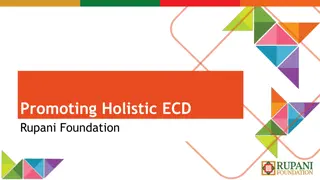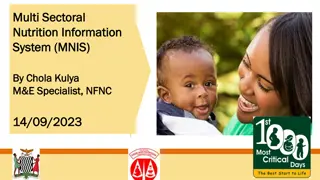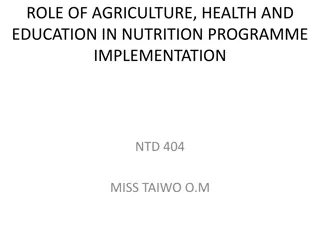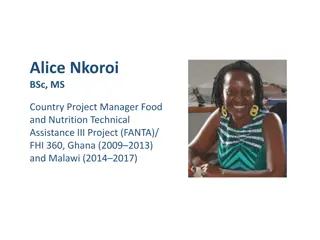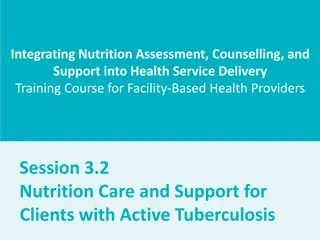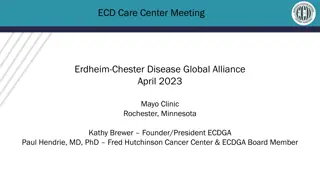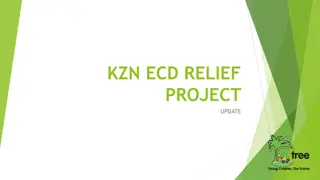Integrated Programming in Education and ECD: Enhancing Nutrition for Child Development
Explore the vital role of nutrition in education and Early Childhood Development (ECD) through integrated programming. Discover how good nutrition impacts children's physical development, health, learning abilities, and cognitive potential, ultimately influencing their educational success. Delve into session learning objectives, entry points for nutrition delivery in education, and strategies for integrating ECD and nutrition effectively.
Download Presentation

Please find below an Image/Link to download the presentation.
The content on the website is provided AS IS for your information and personal use only. It may not be sold, licensed, or shared on other websites without obtaining consent from the author. Download presentation by click this link. If you encounter any issues during the download, it is possible that the publisher has removed the file from their server.
E N D
Presentation Transcript
Integrated Programming Education and ECD
Session Learning Objectives By the end of this session, participants will be able to: Describe the role that nutrition plays in education and Early Childhood Development (ECD) Identify specific activities for the integration of education, ECD and nutrition interventions
Why is Nutrition Important to Education? Good nutrition is important throughout the life cycle. The nutritional status of school-aged children impacts their physical development, health, learning and cognitive potential, and subsequently their school attendance and educational achievement.
Education- Entry Points for Nutrition Delivery point for nutrition awareness campaigns An opportunity to train teachers, parent associations and volunteers on preventing and identifying malnutrition in all its forms An entry point for nutrition monitoring and screening An opportunity for deworming and vitamin A supplementation An opportunity to increase food intake by providing a meal for children
Education- Entry Points for Nutrition An opportunity to develop referral mechanism for malnutrition identified in schools Technical advice on key messages for Education Cluster awareness campaigns School Gardens Nutrition Education Behavior Change Community Mobilization
ECD and Nutrition Integration- Definition Integration of ECD and Nutrition has been defined as having both components delivered simultaneously to the same population, with the objective that they reinforce each other and are cost- effective.
Integrating ECD and Nutrition-How Integrate the key facts of the impact of early childhood development activities and simple messages on how to do them into ALL nutritional materials One to one counseling while weighing/assessing child and handing out supplements Interactive health messaging with mothers/caregivers queuing to receive services
Integrating ECD and Nutrition-How Counseling through nutrition education and behavior change to adopt positive care and feeding behaviors and practices Promoting of the consumption of quality, nutrient-dense, diverse diets and complementary foods Identifying and promoting time and labor saving technologies to help reduce women s workloads When appropriate, promoting the establishment of community family-centered and or subsidized childcare-services
Integrating Nutrition into ECD-How Specific nutrition messages or activities that can be integrated into ECD projects Importance of Exclusive Breast Feeding (EBF) Early initiation of breast feeding (BF) (within one hour or birth) Continued BF for 2 years Timely introduction of appropriate complementary foods at 6 months of age Signs of severe acute malnutrition and where to refer
Monitoring and Evaluation Examples of indicators for use in integrated nutrition and ECD projects: Number of staff (health, nutrition) and ECD volunteers trained on ECD and infant stimulation Number of ECD staff trained on IYCF and SAM identification and referral Package of integrated nutrition and ECD materials developed/adapted Number of caregivers counseled on optimal IYCF practices by ECD staff Number of SAM children referred by ECD staff to CMAM programs Children of mothers trained in ECD show improved cognitive and emotional development and better health & nutrition outcomes
Take Home Messages Child growth and brain development depend on good nutrition AND stimulation and caretaker emotional responsiveness Good nutrition is critical for educational achievements Nutrition and ECD staff should be: knowledgeable of key nutrition and ECD principles and messages understand when and where to refer children and their caregivers to each other s services, and when to integrate these messages and services in to each other s programs







